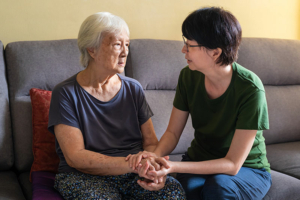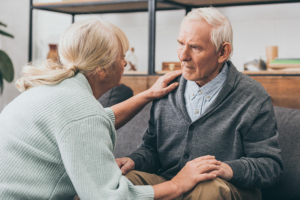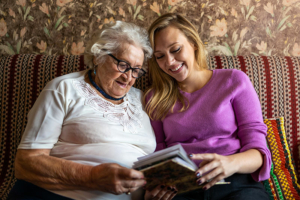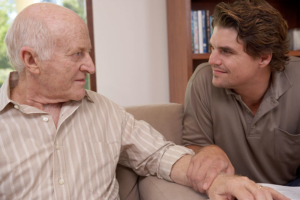New Year’s Resolutions While Caring for Someone with Alzheimer’s

These New Year’s resolutions can help you better prepare for caring for someone with Alzheimer’s in 2023!
While everyone else is focusing on getting more exercise, dropping a few pounds, or sticking to an insufferable diet, as a caregiver caring for someone with Alzheimer’s, just getting through each day will be challenging enough for you. The notion of striving to improve upon any part of your life in this unsettling time can be overwhelming.
At Responsive Home Care, we want to boost your morale. We realize caring for someone with Alzheimer’s is often both frustrating and rewarding, and we’re here to support you by any means we can. To start, we have compiled some resolutions just for Alzheimer’s caregivers that can actually help make your journey a bit easier.
What Resolutions Are Good for a Dementia Caregiver?
Take a step back, and consider the following:
- Make time for you. Of course, that’s easier said than done. But taking time for yourself is vital to both your quality of life and that of the person you are taking care of. It does not need to be anything elaborate or extensive, unless you want it to be. Merely carving out a couple of hours once a week for an activity you like can provide the rejuvenation you need. A reliable family member or friend can fill in while you’re away, or contact Responsive Home Care for a trained, experienced caregiver to help.
- Remind yourself that you know what is best. Family caregivers may find themselves surrounded by well-intentioned people who wish to offer advice. While their ideas may work well for other people, they may not be applicable in your situation. Listen respectfully to any advice offered and thank the individual for the idea, but then ultimately trust your judgment in making the ideal care decisions for your circumstances.
- Take it easy on yourself. At the end of the day, you are human, and it’s inevitable to slip up from time to time. Resolve that this will be the year that you thoroughly rid yourself of any guilt, and in exchange remind yourself that you are doing the very best you can to help make life better for the person you love.
For help with caring for someone with Alzheimer’s and for some additional helpful resources, contact Responsive Home Care any time. We will be pleased to visit with you in your home at no cost to talk about the challenges you are facing and to provide creative solutions to help, such as:
- Help with aggression, wandering, agitation, repetitive behaviors, sundowning, and more
- Planning and preparing meals based on individual preferences
- Providing engaging activities and conversations to keep both mind and body active
- Support as needed with personal hygiene tasks, while cultivating independence
- Transportation and accompaniment to appointments and outings
- And much more
Call us at (954) 486-6440 for more information about our services and how a home health aide in Fort Lauderdale, FL and the nearby areas can help.



 Everyone goes through good days and bad days, and everyone is entitled to negative thinking or irritability every now and then. If you are caring for an older adult who appears to have fallen into a routine of continual negativity and complaining, there could be a reason for it. It’s worthwhile to explore whether or not a health issue may be the culprit for negative mood changes in a senior.
Everyone goes through good days and bad days, and everyone is entitled to negative thinking or irritability every now and then. If you are caring for an older adult who appears to have fallen into a routine of continual negativity and complaining, there could be a reason for it. It’s worthwhile to explore whether or not a health issue may be the culprit for negative mood changes in a senior.






 If it feels like a senior with
If it feels like a senior with